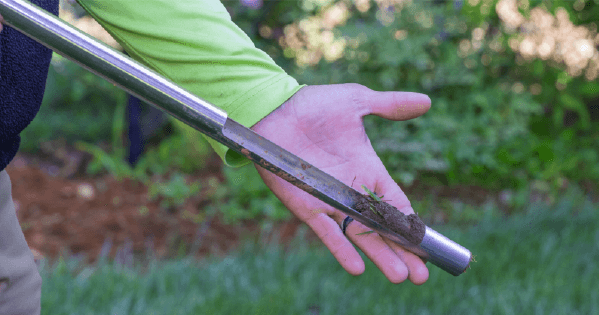Jack Frost Nipping at Your Lawn: How to Prevent Frost Damage This Winter
 Winters in Georgia are relatively mild, but there are still some seasonal hazards to be aware of when it comes to your metro Atlanta landscaping. Frost is possible from late October through mid-April, and is almost certain from November through March. Keep reading to learn how to prevent frost damage to your lawn.
Winters in Georgia are relatively mild, but there are still some seasonal hazards to be aware of when it comes to your metro Atlanta landscaping. Frost is possible from late October through mid-April, and is almost certain from November through March. Keep reading to learn how to prevent frost damage to your lawn.
Lawn Frost Damage
“Nothing burns like the cold.” George R.R. Martin
There’s something beautiful about the crystalline delicacy of a frosty winter morning, with every leaf, branch, and blade of grass outlined in a thin layer of ice. You might be tempted to walk through that frosty grass, crunching a satisfying path of footprints as you go. Unfortunately, a wintry morning frolic is no joke for your lawn!
How Frost Damages Lawns
Frost forms when the surface temperature of an object is cooler than the dew point (the point at which the air is so cold, any water vapor it contains turns to liquid), causing condensation to freeze. Low-lying areas are most affected, which means that your lawn is particularly at-risk for frost damage. If the conditions for a frosty lawn are present, that also means that the water in each blade of grass can freeze. Just like a can of soda forgotten in the freezer, the blades of grass split open as the water freezes and expands.
So, how does all this affect your grass? The ice crystals inside and outside of each blade of grass are very sharp. If left alone, the frost will likely melt when the sun comes up, and the grass will be fine. However, if you walk across the grass when it’s still frosty, you’re pushing and jostling all of those sharp ice crystals around, causing more damage to the grass. Your lawn can take a bit of damage every now and then and bounce back, but here’s where things get dicey: If the grass has endured a particularly heavy frost, or multiple nights of frost in a row, the roots may not be able to nourish and heal the grass leaves fast enough to counteract the impact of the frost. That’s how you end up with frost damage.
How to Prevent Frost Damage to Lawns
Fortunately for you and your lawn, preventing frost damage is easy! All you need are a few ground rules.
- Don’t walk on frosted grass. Make sure your family knows to stick to the walkway or driveway when entering or leaving the house.
- Continue to water your lawn. A good watering the evening before a frost is expected can actually insulate and strengthen the grass, protecting it from cold damage.
- Don’t let your pets run around on frosted grass. Feet or paws make no difference; they can both damage grass in the winter. If you have to let your dog out for a bathroom break during frosty hours, consider turning your sprinklers on to melt the ice before you release the hound(s). And while we’re on the subject, do NOT drive on your frosted lawn!
We’re passionate about giving metro Atlanta homeowners the best residential lawn care, and our plant health care specialists are certified by the Georgia Department of Agriculture. Give us a call at 770-923-0387 to learn more about our lawn care services, or get an estimate online.
About Simply Green Lawn Care

Simply Green aims to provide the highest quality lawn care, mosquito control, and lawn pest control services to Georgia residents.
We are locally owned and operated which allows us to be accessible, attentive, and responsive for customers in Georgia.
Our well-trained team is easy to work with and determined to exceed expectations.
All our plant health care specialists are Georgia Department of Agriculture Certified and maintain their Category 24 applicators license.

